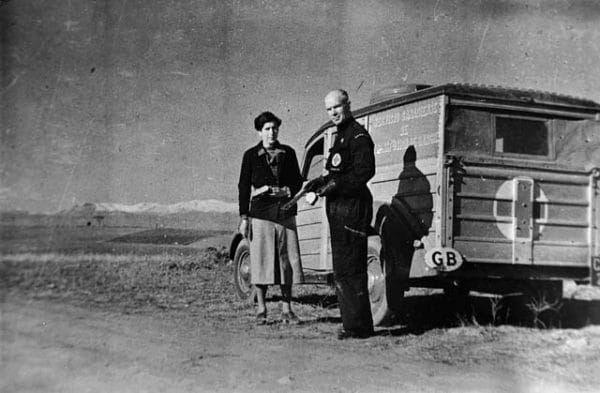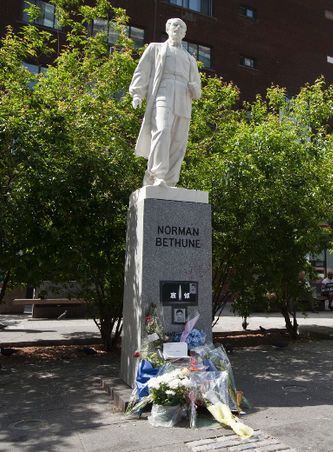Innovator Norman Bethune an ignored cultural link between Canada and China

1936: Dr. Norman Bethune stands in front of The Canadian Blood Transfusion Unit which operated during the Spanish Civil War. Dr. Norman Bethune, an Ontario-born communist who developed the mobile surgical field hospital while assisting the Red Army in China during that country’s war with Japan, would have been 113 on March 4th.
Don’t know who he is? Scrambling for Wikipedia? Bethune is nothing less than the most famous Canadian in the world, claims former Governor General Adrienne Clarkson, author of a 2009 book about the man.
Clarkson cites the “numbers game”, fame among China’s 1.5 billion being the X factor that catapults him ahead of contenders such as Justin Bieber or William Shatner. She doesn’t mention Dashan (a Torontonian who has mastered the art of a particularly difficult form of Chinese wordplay called xiangshen), who might now be more famous than Bethune for being the Benny Hill of China, basically. What Dashan has in common with Bethune is that literally almost no one in Canada knows who he is.
For a certain generation of Chinese people, though, if you mention that you’re Canadian, a smile will always appear accompanied by the name: “Bethune”. Taxi drivers will treat you nicer. People in China will confer on you a greater moral fibre than you probably have a right to claim. Molson hasn’t made an ad campaign out of it yet, but you might as well take advantage.
What Bethune created was essentially a precursor of the MASH mobile army surgical hospital, later immortalized in Robert Altman’s great film, starring Donald Sutherland as “Hawkeye” Pierce. Bethune himself was also immortalized on film, in an eponymous biopic starring, in a tidy instance of continuity, Donald Sutherland. His was a brilliant technological innovation, and like many such inventions was born of necessity. These were still early days in the understanding of blood. The discovery that people had different blood types, and that not all could donate to everyone, had only been recently made.
Although he perfected his technique of blood transfusion in China, under battle conditions, he developed it while in training at the Royal Victoria Hospital in Montreal. There remains a nice statue of him in the city’s downtown core, which touchingly turns into a shrine whenever an event affecting the Chinese community brings them together.

Even while still in Toronto, he developed an internationalist sensibility, living near Kensington Market, home to the city’s Jewish community, and its burgeoning Chinatown. In Montreal, he worked in a French-Canadian hospital, Sacré Cœur, which became one of the first hospitals in the country to develop a blood bank. His first foray into battle came during the Spanish Civil War, where he ran a mobile blood transfusion unit involving a kerosene-run refrigerator and a sterilization unit. His headquarters in Madrid became known as the “Servicio Canadiense de Transfusion de Sangre”, staffed by more than 100 people, filling an immense need for the blood that had been spilled by soldiers from around the world who had signed up to defeat fascism in Spain.
In asking civilians to donate blood in the cities for use by soldiers wounded in the field, Bethune knew that the intimate nature of such aid was more than just a symbolic type of solidarity. As a colleague of Bethune’s wrote at the time, “Men die but the blood fights on in other veins, and their purpose fills our hearts.”
The problem of preserving blood was both a practical and a theoretical riddle, and one which vexed Bethune on both fronts. In developing practical solutions for the problem of blood storage on the battlefield, Bethune made great strides in understanding, and helping others understand, the nature of blood.
So how, exactly, did Bethune become so famous in China? Simple. Mao Zedong, grateful for the work he had done in China, loved him. Mao’s essay, entitled In Memory of Norman Bethune, became required reading in China in the 1960’s, and continues to be a school text to this day.
Canadians of Chinese decent now make up more than 4% of our population, about 1.3-million people as of 2006. What’s more, China has now passed Britain as Canada’s number two export destination. Canadian goods exports to China rose 15% last year to $19.3-billion.
It seems utterly careless that any Canadian innovator would not be recognized for his achievements within his own country. In the case of Norman Bethune, who is an important cultural link between Canada and China, it is an oversight that we would all benefit from correcting, politics be damned.
_____________

Terry Dawes
Writer
